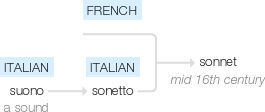Sonnet
mid 16th century: from French, or from Italian sonetto, diminutive of suono ‘a sound’.
wiktionary
Borrowed from Middle French sonnet, from Italian sonetto, from Old Occitan sonet(“a song”), diminutive of son(“song, sound”), from Latin sonus(“sound”).
etymonline
sonnet (n.)
1557 (in title of Surrey's poems), from French sonnet (1540s) or directly from Italian sonetto, literally "little song," from Old Provençal sonet "song," diminutive of son "song, sound," from Latin sonus "sound" (from PIE root *swen- "to sound").
Originally in English also "any short lyric poem;" precise meaning is from Italian, where Petrarch (14c.) developed a scheme of an eight-line stanza (rhymed abba abba) followed by a six-line stanza (cdecde, the Italian sestet, or cdcdcd, the Sicilian sestet). Shakespeare developed the English Sonnet for his rhyme-poor native tongue: three Sicilian quatrains followed by a heroic couplet (ababcdcdefefgg). The first stanza sets a situation or problem, and the second comments on it or resolves it.
